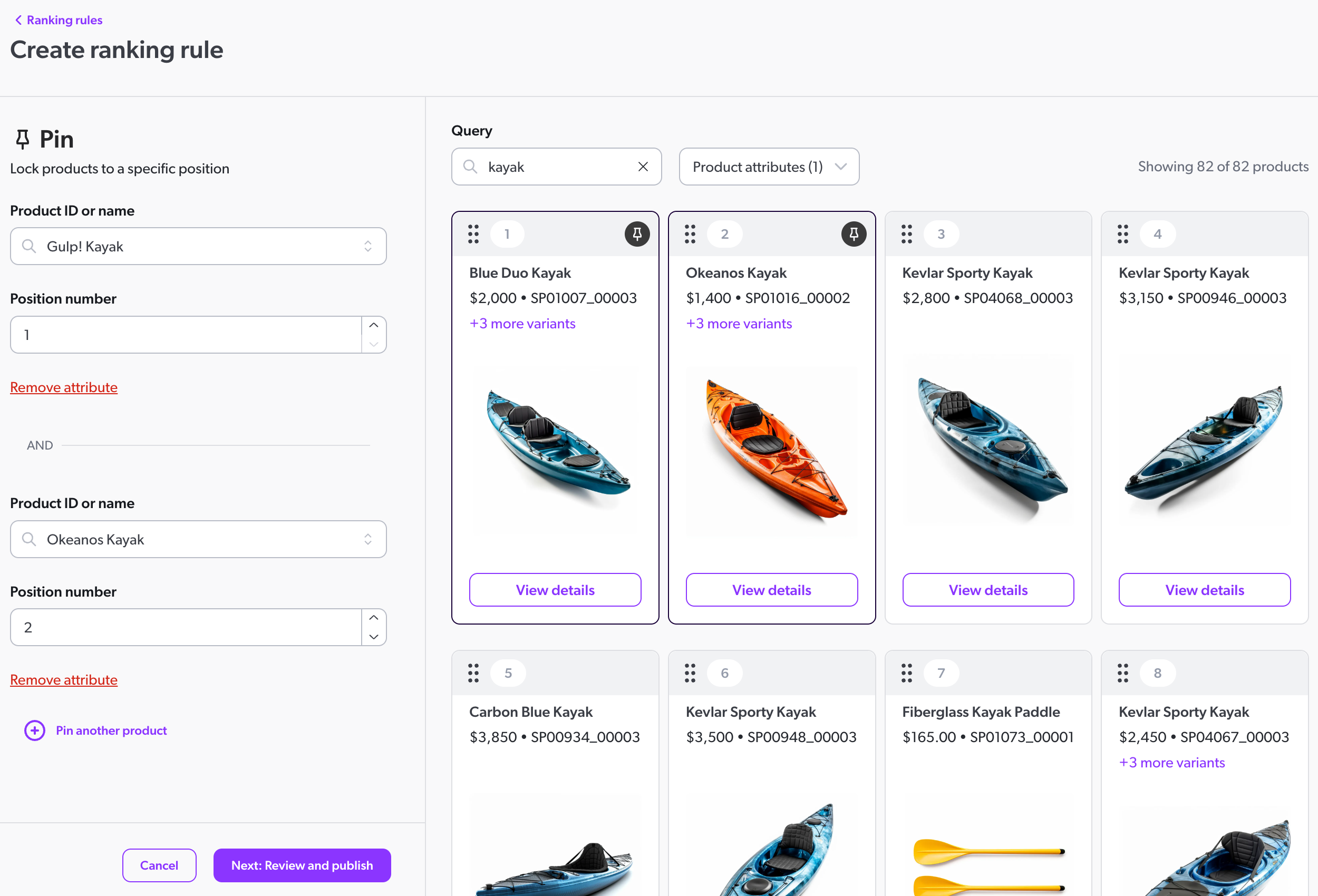Pin rules for search
Pin rules for search
In the Search manager of the Coveo Merchandising Hub (CMH), merchandisers can define pin ranking rules to make specific products appear at the top of the search results for one or more specific queries. However, multiple pin rules with the same target can conflict with one another.
Merchandisers can also use pin rules to enforce a specific product order in the search results for one or more specific queries.

Use case examples
Pin ranking rules can be used to address a variety of use cases. Here are a few examples:
-
Enforce a specific order: Pin products to the top of the search results to enforce a specific order when specific queries are performed.
-
Pin best sellers: Pin best-selling products to the top of the search results when specific queries are performed.
-
Pin clearance items: Pin clearance items to the top of the search results when specific queries are performed.
Pin rule conflicts
Pin ranking rules override the content that should otherwise appear at a specific position in the search results. This includes other pin rules that target the same position, so merchandisers must not create multiple pin rules that target the same position for the same query.
Pin rule conflicts are resolved on a last-in, first-out basis.
On March 1, you create a rule that pins the product "Carbon Blue Kayak" at position 2 for the query kayak.
On March 10, you create another rule that pins the product "Okeanos Kayak" at position 2 for the queries kayak, sea kayak, and sports kayak.
Because both pin rules target the same position for the query kayak, only the most recent rule applies.
When a user searches for kayak, "Okeanos Kayak" is pinned at position 2 in the search results.
Prerequisites
To create rules in the Coveo Merchandising Hub (CMH), you must meet the following prerequisites:
-
You must choose the correct property to ensure that your changes affect the intended queries.
Create a pin rule
-
In the CMH, access the Search manager.
-
From the navigation tabs, select ranking rules and then click Create ranking rule.
-
Under This rule will apply to, define the scope of the rule.
-
Locale: Select the locale for which the pin rule will apply. By default, a rule applies to all available locales.
-
Audiences: Select the audience that the pin rule will target. You can choose between predefined audience profiles or create custom profiles. You can only select one audience profile per rule.
The Audience option is currently in early access. If you are interested in using the Audience option, reach out to your Customer Success Manager (CSM).
-
All visitors: By default, the filter rule applies to all visitors.
-
Devices & technology: Target visitors visiting a storefront using a specific device type. The device type is determined by the information sent by the visitor’s browser, and not the device’s screen size. Available options are:
-
Desktop: Encompasses desktop computers and laptops.
-
Mobile: Encompasses all mobile phones.
-
Tablet: Encompasses all tablets.
-
-
Visitor type: Target the visitors who are logged into the storefront or those who are not.
-
Your audience: Create a custom audience profile that you can reuse in other rules sharing the same property Note that once a custom audience profile is created, it can’t be modified once the rule is published. If all rules containing a custom audience profile are deleted, it will no longer be available as an option when creating new rules.
-
Visitor’s URL: Target visitors based on the URL of the storefront page they are on.
-
Referrer URL: Target visitors based on the URL they came from before landing on the storefront.
-
-
-
query: Pin rules can’t be used if your rule is scoped to All queries, so select Specific queries.
Select an Operator. Currently, only the
Isoperator is available.Select one or more queries to which the pin rule will apply, and then click Done.
-
-
Under Choose an action, select Pin.
-
To pin a product, you can either search for the product or use the preview to select the products to pin.
-
To search for a product:
-
Under Product ID or name, select the product to pin.
-
Under Position number, enter the number of the position where the product will appear in the search results.
-
(Optional) To pin more than one product, click Pin another product and repeat the previous steps.
-
-
When using the preview, drag a product and drop it at a position to pin it there.
-
-
Click Next: Review and publish.
Leading practicesYou can preview the effect of your rules in the panel on the right side of the page. Use this panel to simulate queries and see how the rule affects the search results for a given locale.
-
Review your rule configuration and then click Next: Publish.
-
Under Rule name, enter a meaningful name for your rule.
-
Click Publish now. The rule now applies.
Manage existing pin rules
-
In the CMH, access the Search manager.
-
From the navigation tabs, select ranking rules.
-
Locate the rule you want to manage.
-
Click Modify. You now have to option to modify the rule configuration, modify the publish settings, or delete the rule:
-
To modify the rule configuration, click Rule.
-
To modify the publish settings, click Publish settings.
-
To delete the rule, click Delete.
-